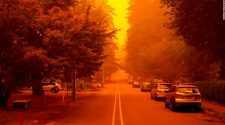Whether the world feels small, close and manageable, or foreign, unknowable and chaotic, says something about where you live and what sort of device you carry in your hand.
For the former, the world is made small by smartphones.
No matter the view outside our homes (the Alps or skyscrapers or a frozen lake), what’s on our screens looks pretty much the same, the world over. Billions of us share the same apps and search engines.
We get our news at the same time – immediately after it is uploaded to global platforms such as Facebook, Google news and Apple (their hegemony both a cause and a byproduct of the death of local newspapers).
It’s delivered in real time to our phones (often via the incursion of an alert), whether it’s an inflammatory tweet from Donald Trump, a vote in the British parliament or a dispute between two Wags.
This immediacy (and the urgency of push notifications) distorts the scale, relevance and impact of the news we are receiving. It also makes the world seem smaller, closer and flatter.
This was once seen as a great leap forward – the key, potentially, to ending conflict.
Fourteen years ago the New York Times’ economics columnist Thomas Friedman wrote a book called The World Is Flat, which examined this sense of closeness through the lens of global trade. The world, he wrote, was becoming more connected through trade, technology and multinationals, whose supply chains forced people from different countries into a state of cooperation.
Friedman even floated a hypothesis that all this connectivity would ease conflict. Dubbing it the Dell Theory of Conflict Prevention, he promised: “No two countries that are both part of a major global supply chain, like Dell’s, will ever fight a war against each other.”
I enjoyed the book when I read it at the time, not realising of course what would come to pass. First, we have seen forces push back against globalisation: namely in Trump’s election(“Make America Great Again”) and in Britain’s Brexit vote to leave the EU.
Second, there has been a curdling in our enthusiasm for what is essentially the connective tissue of globalisation, the internet.
The thing that has helped flatten the world has gained so much power and momentum it has swallowed the world instead. Jia Tolentino in her book of essays, Trick Mirror, called the internet “a feverish, electric, unlivable hell”.
But in 2005, when Friedman’s book was published, the internet was smaller, weirder and slower, and accessed largely via PCs.
Tolentino says the internet has “become the central organ of contemporary life” and outlines why and how it has distorted human experience. She keeps coming back to its scale, the collapse of which she labels “psychologically destructive”.
This collapse of scale was something Friedman was attempting to describe, but mainly insofar as it affected global business. As he charts it, everything from political events such as the collapse of the Berlin Wall (suddenly everyone has access to blue jeans!) to the closeness of workers in different countries handing over to colleagues in other timezones – led to the world feeling more manageable.
Friedman was criticised by geographers who said the world might be flat in some places – mainly cities that have the population, conditions and infrastructure to be part of the global supply chain – but a lot of it was too poor and too chaotic to hook into a reliable chain.
I have the same question about geography these days, but in relation to the internet. Does it act as giant flattening iron, or are its effects felt more strongly in some places than others? (Making the world more spiky than flat.)
I’ve pondered this on my travels and found that increasingly there are fewer places that feel genuinely other, untouched by the hegemony of these platforms we share.
Last year I spent a month in Sri Lanka, where there are more than 6 million people on Facebook. The network had to be temporarily shutdown by the government after anti-Muslim riots.
The year before I travelled to Myanmar, where 20 million people, or 40% of the population, have Facebook. The app comes preinstalled on most smartphones in both countries.
In remote Shan state, we stayed with locals in rural villages. At night we would pass around bottles of whisky and their phones, on which they showed us YouTube clips of the Shan State Army training in the nearby jungle. It didn’t matter that we didn’t speak the same language, we shared the same platforms.
Then last month I was in Mongolia and spent eight days meeting nomadic people who travel with their livestock, setting up ger camps. Some had phones, some didn’t. Those who did had to go to the top of a mountain to get a signal.
When we met a hot eagle hunter, 26-year-old Jinsbeck, we wondered if he was on Instagram. But we couldn’t even find mention of him online (this has been remedied after a fellow traveller wrote a feature about him for Vice).
Many of the roads we travelled were not recorded on Google Maps and, in the capital, a strange analogue version of Uber had people hailing down random cars and negotiating a price with the driver.
Of course, many Mongolians swing between being connected and being off the grid. We met one who was an accountant before becoming a nomad. And our guide, who lives in the capital, has a strong desire to become a nomad once his children are older.
It’s easy to romanticise places where the thing that has you in its thrall hasn’t arrived yet – until you realise it may not have arrived for market-driven reasons.
Nomads living in an isolated western flank of the country with small herds of animals are not likely customers for Amazon Prime or targeted Facebook ads.
Being beyond the reach of the market makes them in a sense beyond the reach of the internet – or of no use to the platforms that these days ARE the internet.
In my desire to find a place untainted by the internet, there is some projection. As much as I want to escape the platforms that follow me almost everywhere, the places they don’t reach have their own oppressive systems (the patriarchy is pretty well entrenched in nomadic culture) and struggles.
















